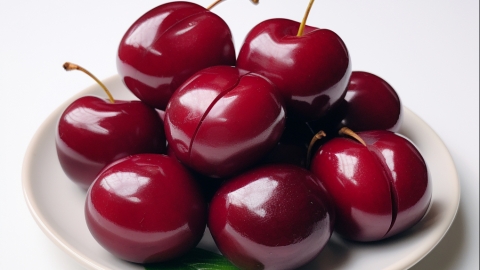What should cherries not be eaten with?
Under normal circumstances, when consuming cherries, one should indeed pay attention to their combination with certain foods and medications. Foods that should not be consumed together with cherries include animal liver, strawberries, carrots, cucumbers, durian, and others. Medications that should not be taken with cherries include ephedrine hydrochloride and diphenhydramine tablets, gliclazide tablets, chlorpheniramine maleate tablets, aspirin enteric-coated tablets, levonorgestrel tablets, etc. Detailed explanations are as follows:

I. Foods
1. Animal Liver
Cherries are rich in iron, and animal liver also contains abundant copper and iron. Consuming them together may cause a chemical reaction that could reduce the nutritional value of cherries.
2. Strawberries
Strawberries are rich in vitamin C, while cherries contain large amounts of vitamin C-degrading enzymes. Consuming them together may reduce the vitamin C content in strawberries, affecting their nutritional value.
3. Carrots
Carrots are rich in beta-carotene, and cherries also contain vitamin C-degrading enzymes. Eating them together may destroy vitamin C and vitamin A in carrots, reducing their nutritional value.
4. Cucumbers
Cucumbers contain an enzyme that can break down vitamin C. Cherries are rich in vitamin C, and consuming them together may reduce the vitamin C content in cherries.
5. Durian
Durian is a heaty fruit, while cherries are considered cooling. Consuming them together may easily cause gastrointestinal discomfort and possibly lead to symptoms such as diarrhea.
II. Medications
1. Ephedrine Hydrochloride and Diphenhydramine Tablets
Ephedrine hydrochloride and diphenhydramine tablets are antihistamine medications primarily used to treat allergies. Certain components in cherries may affect the metabolism of ephedrine hydrochloride and diphenhydramine tablets, leading to reduced efficacy. Therefore, to avoid weakening the medication's effectiveness, it is not recommended to consume cherries while taking ephedrine hydrochloride and diphenhydramine tablets.
2. Gliclazide Tablets
Gliclazide tablets are hypoglycemic medications primarily used for treating diabetes. Cherries contain relatively high sugar content; if consumed together with hypoglycemic drugs, it may lower blood sugar levels, which is detrimental to the health of diabetic patients and increases the risk of adverse reactions.
3. Chlorpheniramine Maleate Tablets
Chlorpheniramine maleate tablets are antiallergic medications, and their metabolism may be affected by some components in cherries, leading to reduced efficacy. While taking chlorpheniramine maleate tablets, cherries should be avoided to ensure the effectiveness of the medication.
4. Aspirin Enteric-Coated Tablets
Aspirin enteric-coated tablets are cardiovascular medications with various functions, including analgesia, antipyresis, anti-inflammatory effects, and treatment for rheumatism. Cherries are rich in vitamin C, while aspirin enteric-coated tablets contain salicylates. Combining the two may form complexes that reduce the efficacy of aspirin.
5. Levonorgestrel Tablets
Levonorgestrel tablets are oral contraceptives whose efficacy may be affected by certain components in cherries, potentially reducing effectiveness or increasing side effects.
When consuming cherries, one should avoid simultaneous intake with the aforementioned foods and medications. If there are concerns or the need to take multiple medications concurrently, it is advisable to consult a doctor or pharmacist for guidance.




